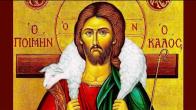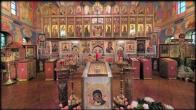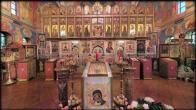ABOUT ORTHODOXY
You are here
The Parable of the Leaven
The parable of the leaven is preserved by the Evangelists Matthew (13:33-35) and Luke (13:20-21). This brief parable is set forth by the the Evangelist Matthew thus:
The kingdom of heaven is like unto leaven, which a woman took, and hid in three measures of meal, till the whole was leavened.
In this parable, as in the preceding parable (of the mustard seed), Christ is comparing the Kingdom of Heaven not with leaven itself, but with the ultimate process of its action on flour and dough. The Lord chooses for the parable that which occurs in nature, in order to show that His word is just as immutable as the laws of nature are immutable. Christ is reminding us that an insignificant amount of leaven (yeast), placed in a large volume of dough, imparts to it its properties and stimulates fermentation in it.
Magnificent in its historical breadth and psychological depth, the parable of the leaven depicts the inner, hidden action of the Gospel preaching not only on the whole world, but also on individual persons. The Lord develops the idea, expressed by Him in the parable of the mustard seed, of the future of the Kingdom of God the Church founded by Him on earth.
During the life of Jesus Christ, the Church the Kingdom of God on earth consisted of a handful of illiterate disciples. Who among Christ's contemporaries could have imagined that the Church, with such an initial, seemingly pitiful, composition, would spread throughout the whole world? But none the less, this happened. The new faith, preached by Christ and His Apostles, produced something similar to that which yeast produces in dough. The Apostle Paul writes: Know ye not that a little leaven leaveneth the whole lump? (I Corinthians 5:6). Indeed, leaven, no matter how small, imparts its property acidity to the whole mixture of flour. So also the new faith, which seemed in the beginning completely limited in its activities, like fermentation from yeast produced a revolution in the minds and hearts of millions of people.
The meaning of the figurative comparison of the Kingdom of God with dough, raised by the action of yeast, is that in both instances a living, creative beginning is at work. The heavenly leaven the grace of the Divine Spirit, placed by the Saviour in the human souls which compose His Church the Kingdom of God on earth , determines the growth of their inner, spiritual life. And as the leavened dough rises until the leaven is mixed with it completely, so also the process of establishing the Kingdom of God will continue until all its true children enter into it.
On the historical plane of establishing the Kingdom of God, the "three measures" of the parable signify, according to the explanation of the Serbian bishop, Nicholas of Ochrid, the three branches of the human race the Semites, Japhites and Hamites, and they point to the bringing of the heavenly leaven grace by the Saviour to earth, to all mankind without any limitation. On the individual plane, the faith of Christ, like leaven, is capable of transfiguring the whole of human nature, introducing into it a new, Divine life. According to the interpretation of Blessed Augustine, the "three measures" of flour signify the three main powers of the human soul mind, heart and will; that is, the power of thought, the power of feeling and the power of operation which are gradually sanctified by the grace of the Holy Spirit. The grace of God penetrates and sanctifies further the spirit, soul and body of a man. Armed with the power of grace, a man enters into a life completely different from the ordinary. The mind of such a man becomes the mind of Christ; that is, the understanding of a transfigured man is in full obedience to faith; he is capable of attaining the mystery of salvation. The desire and actions of a man leavened by the grace of God are elevated to full agreement with the will of the Lord. In the hearts of men reborn and cleansed by grace the peace of good reigns. The body of a reborn man itself becomes the pure vessel of pure faith. In this way, the life creating leaven penetrates the whole being of a man till the whole [is] leavened, i.e., until he attains perfection in Christ and becomes a new creature.
The Fathers of the Church emphasize the extremely important detail, essential for a proper understanding of the parable: the heavenly leaven, the grace of God, acts on dough made from unspoiled flour. Stale, spoiled flour will not sour, will not rise, will not yield to the action of yeast. The grace of God does not act in a negligent soul. In order that the Divine leaven would do its work, we must through repentance and spiritual struggle with all the vices prepare the dough of our soul and body in patience. Success in the struggle with one's sinful "I", with one's "old man" is not attained easily or quickly. And yeast does not suddenly leaven dough, but gradually. It is impossible to be confirmed immediately in struggles for piety and virtue. It is necessary every minute, every day, to exercise oneself in them continually, to struggle continually with temptations and weaknesses, in order to be confirmed in a truly spiritual life to try to live as the Lord wishes.
Every attempt always begins with something small. In this is contained all the science of Christian life: try to live in accordance with the will of Christ, beginning always with the small. A little leaven leaveneth the whole lump. A little mustard seed in time becomes a great tree.
In order to begin this little work, strength, which will help us to fulfill the commandments of Christ, is essential. This strength we receive in Christ's Church. The closer and more sincerely we will unite with Christ in this mystery, the more spiritual strength we shall receive in order to fulfill His commandments.
©V. Potapov
PARISH LIFE
RECENT VIDEOS
Address of our Cathedral
Subscribe to our mailing list
While all the materials on this site are copyrighted, you may use them freely as long as you treat them
with respect and provide attribution on the Russian Orthodox Cathedral of St.John the Baptist of Washington DC.









